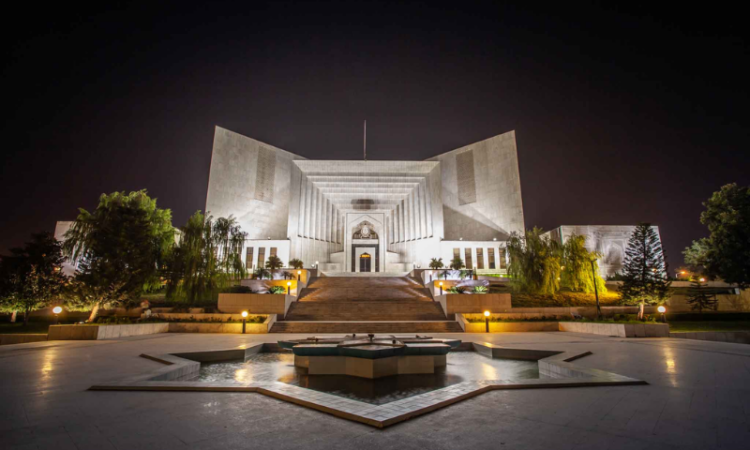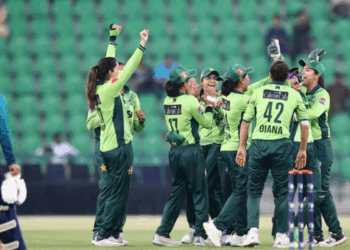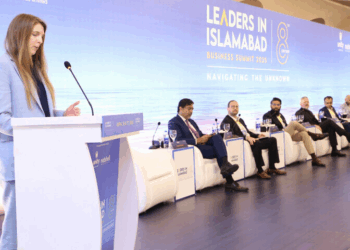Islamabad, February 19, 2025: The Supreme Court of Pakistan resumed hearings on intra-court appeals challenging the trial of civilians in military courts, with Justice Aminuddin Khan emphasizing that the court is not under trial and must decide cases strictly in accordance with the Constitution and the law.
A seven-member constitutional bench, led by Justice Aminuddin Khan and comprising Justices Jamal Khan Mandokhail, Muhammad Ali Mazhar, Hassan Azhar Rizvi, Musarat Hilali, Naeem Akhtar Afghan, and Shahid Bilal Hassan, is presiding over the appeals.
At the outset, Latif Khosa, counsel for Aitzaz Ahsan, sought permission to present arguments in place of Uzair Bhandari, a request that Justice Khan granted.
During the proceedings, Justice Khan noted that Aitzaz Ahsan had earlier raised objections to arguments presented by Salman Akram Raja, who also represents him. Justice Mazhar suggested that Ahsan’s objection pertained to Article 63A, to which Raja clarified that he disagreed with only one paragraph but stood by his earlier arguments.
Meanwhile, Justice Afghan cautioned against undue influence from social media, while Justice Mandokhail urged responsible media reporting. Justice Hilali also highlighted concerns about false reporting but refrained from commenting further due to her judicial role.
Advocate Khosa asserted that the nation is closely watching the case, suggesting that the Supreme Court itself was under trial—a claim Justice Khan dismissed outright. Emphasizing the importance of judicial precedent, Khosa was directed by Justice Mandokhail to focus on the constitutional status of Section 2D.
Justice Khan instructed Khosa to present his arguments independently before linking them to the May 9 and 10 incidents. Khosa argued that military courts violate fundamental rights and deemed Section 2D unconstitutional. He also referenced the Hamoodur Rehman Commission Report, which attributed past military interventions to growing public resentment.
In response to Justice Mandokhail’s query about whether the Constitution permits the enactment of new laws, Khosa explained that military courts previously required the 21st Amendment and reiterated that civilians should not be tried in military courts due to their lack of independence. He stressed that this was why a judicial commission was sought to investigate the May 9 incidents.
Justice Khan recalled that Khawaja Haris had previously defended military courts as ensuring a transparent trial process. Justice Mandokhail questioned Khosa on why he had not opposed Section 2D during his political tenure, while Justice Hilali pointed out inconsistencies between his parliamentary stance and court arguments, asserting that military courts were not responsible for the fall of Dhaka.
Khosa reaffirmed his support for a strong, publicly backed military while urging the judiciary to end military trials. He claimed that the 26th Amendment was passed under coercion and called on judges to restore the military’s dignity by ruling against such trials.
When Justice Hilali inquired whether any lawmakers had resigned in protest of the 26th Amendment, Khosa cited Akhtar Mengal’s resignation. Justice Mazhar questioned why military courts were not abolished under the 21st Amendment, to which Khosa responded that they were retained due to the prevailing security situation at the time.
Justice Mandokhail asked whether military courts had successfully eliminated terrorism, to which Khosa argued that they had not, citing ongoing security challenges. He criticized provincialism, blaming the 18th Amendment for increasing divisions, and emphasized that the military should operate within constitutional limits in its fight against terrorism.
Justices Hilali and Mandokhail advised Khosa to raise these concerns in Parliament, but Khosa claimed that his microphone is often muted during sessions. He further accused lawmakers of passing amendments only to later seek judicial intervention to nullify them.
When Justice Mandokhail asked whether Khosa had voted against the amendment, Khosa replied that PTI had abstained. Justice Mandokhail remarked that it was Khosa’s responsibility to oppose it in Parliament.
The hearing was adjourned until the next session.








